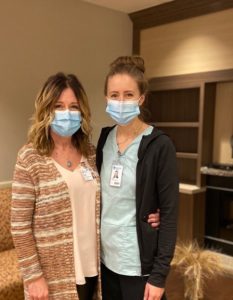
Alyssa Ness never expected to follow in her mother’s footsteps as a licensed practical nurse.
Ness grew up watching her mom, Gail Olofson, in various health-care roles throughout Flagstaff County including acute care, long-term care, home care, teaching, and, more recently, management.
Ness originally pursued a career as an emergency medical technician (EMT) after working as a paramedic following high school.
Watching the nurses in the fast-paced emergency room as part of an in-hospital EMT training session was enough to make her reconsider her career choice.
“I always told myself I was never going to do the same career as my mom,” said Ness. “I thought: ‘No, it’s not for me, I’m just not cut out to be a nurse. So, I got it out of my head. Then, as I aged, I thought: ‘Oh, maybe this is something I’m interested in.’”
Today, Ness works as a licensed practical nurse (LPN) at the Killam Health Centre where Olofson is her manager. Ness is pleased to care for both acute and continuing care patients in her home community of Killam, located about 70 km east of Camrose. Just 10 minutes down the highway in the town of Sedgewick, Ness can also be found working out of the Sedgewick Community Health Centre providing in-home care.
While both mother and daughter have LPN training, they find different aspects of the profession fascinating. The adrenalin boost as a front-line caregiver in the emergency department is a draw for Ness, while Olofson has found her niche in teaching and administration over the past three decades and counting.
I know a lot of people that come through those doors, and I think it’s comforting for them, and for me, just knowing each other and being able to help them and make a difference in their lives.” -Alyssa Ness, licensed practical nurse
The long-time LPN originally planned to become a registered nurse (RN), but plans changed when Olofson met her future husband in her home community. Wanting to stay closer to home, she enrolled in the LPN Program offered by Bow Valley College in Stettler, an easier transition for the young woman who was raised in the village of Forestburg, near Killam.
Looking back on her 32-year career, Olofsan has no regrets in choosing the LPN path as she has been offered many career opportunities in health care including teaching and management.
“Things started to fall in place, and I got the opportunity to start teaching health-care aides … through the NorQuest Program. It’s amazing to me, looking back, how many opportunities there were to grow as an LPN, and I wasn’t held back.”
“I always strived for more,” Olofson said, explaining she originally thought her LPN training was limited to hospital-based positions in emergency and acute care.
Since then, so much has changed with an LPN’s scope of practice expanding to involve much greater responsibility in many areas of health-care.
Today, Olofson oversees continuing care in the Killam Health Centre as a resident care manager. She also works as a coordinator training Covenant Health staff on use of the Resident Assessment Instrument—a program that regularly assesses the health-care status of patients in-home care, long-term care, and supportive living.
“I’m a people person. I have always wanted to care for people … especially when it came to health care,” Olofson said. “It just makes me feel good to make somebody else feel better.”
Like her mom, Ness is pleased with her career choice, especially the opportunities available in the region where she grew up. The mother-daughter duo say they enjoy passing each other in the hallway at work. Ness even conducted the health centre’s COVID Daily Fit for Work Screening on Olofson the day of the interview.
Rural nursing is very special.” -Alyssa Ness, licensed practical nurse
As a rural LPN, Ness values the opportunity to work and help the patients she knows as colleagues, family, and friends.
“I know a lot of people that come through those doors, and I think it’s comforting for them, and for me, just knowing each other and being able to help them and make a difference in their lives,” said Ness, who recently returned to work after maternity leave. “It’s really heartwarming.”
“I can make the connections with the older residents. I can tell them my last name and they make their connections of friends they grew up with or (maybe) they knew my grandma or grandpa,” Ness explained.
“I will never move away from small towns. When I did my paramedic training, I lived in the city, and I couldn’t get out of there fast enough…”
“Rural nursing is very special.”
— Lorena Franchuk
Did you enjoy this article?
Subscribe to the Rural Health Beat to get an article about positive developments in rural health delivered to your inbox each week.
Oops! We could not locate your form.
